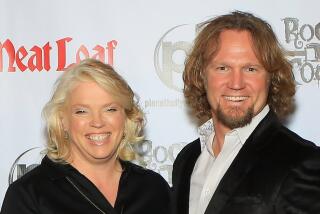Introducing the Classical Virgins
- Share via
With its initial release, Virgin Classics shows commendable interest in truly expanding the compact disc catalogue rather than merely inflating it with still more “favorites.”
Virgin Classics--an offshoot of Virgin Records, the giant British pop label and retailer (which also happens to own an airline)--scores a coup at the outset. It is offering the recorded debut (7 90710, two CDs) of the American folk opera “Paul Bunyan,” composed in the United States by Benjamin Britten, to a text by W. H. Auden in 1941, at which time it proved a resounding flop. Happily, Britten revised the work in 1975 and came up with a winner.
“Paul Bunyan” is a disingenuous theatrical gem that calls not for golden-throated opera stars but for less prepossessing singing actors--music that achieves its delightful effect through simple, folk-like ballads with banjo or guitar accompaniment, a strong blues element, spacious, Copland-esque orchestral melodies, choral spirituals, even nods in the direction of the 1930s Broadway musical.
Britten’s clever, funny, poignant jumble dovetails with a wry text that manages to enlarge the legend of the giant lumberjack into a sort of history of American civilization, from prehistoric (and prehuman) innocence to 20th-Century venality.
The all-American performance, superb in all respects, is by soloists, chorus and orchestra of the Plymouth Music Series under conductor Philip Brunelle.
Among other Virgin firsts are the Schubert “Great” C-major Symphony played on period instruments, with every repeat intact (bringing it in at a numbing 59 1/2 minutes). It is performed by something that sounds more like a graduate school course than a performing ensemble, the Orchestra of the Age of Enlightenment, conducted with academic precision by Sir Charles Mackerras (7 90708).
The post-Romantic scores of Gerald Finzi (1901-1956) rarely travel beyond their native British climes and indeed may be too undemonstrative for most tastes. The present program (7 90718) includes Finzi’s best-known composition, the sweetly yearning “Dies Natalis,” to words of the 17th-Century English poet Thomas Traherne; also, the more outgoing Clarinet Concerto, in flawless performances by tenor Martyn Hill, clarinetist Michael Collins and the City of London Sinfonia conducted by Richard Hickox.
“Songs Cathy Sang” (7 90704) is a collection of material written for the late Cathy Berberian, the American mezzo-soprano who was one of the first virtuosi of extended vocal technique.
Among the pieces presented here by British mezzo Linda Hurst are the folk song arrangements made for Berberian by her one-time husband, Luciano Berio; John Cage’s magnificently creepy Aria; and Cathy Berberian’s own, hilarious “Stripsody,” mainly a keening recitation of comic-strip onomatopoeia. Hurst, an erstwhile Swingle Singer, while lacking Berberian’s sexy timbre in the folk songs, is everywhere an appealing, brainy singer as well as a superb vocal actress. The expert accompaniments in the Berio are by the London Sinfonietta under Diego Masson.
The program of works by Michael Tippett (7 90701)--his gorgeous Concerto for Double String Orchestra (1939) and Fantasia Concertante on a Theme of Corelli (1953) as well as the tougher, darker and more complex “Songs for Dov” (1972)--is notable not only for presenting a cogent overview of three distinct stylistic periods in the composer’s development but also for the breadth and warmth of his directing of the Scottish Chamber Orchestra, most notably in the Concerto. Composer-conductors seldom display such loving regard for their early creations. The tenorial flights of the “Songs for Dov” are dazzlingly executed by Nigel Robson.
Hardly offbeat repertory, but the coupling of the Brahms Piano Quartets in G minor and C minor (7 90709) is a double pleasure: for the lucid, sharply profiled performances by Britain’s Domus ensemble and for Virgin’s generous accommodation of both works--76 minutes of music--on a single CD.
More to Read
The biggest entertainment stories
Get our big stories about Hollywood, film, television, music, arts, culture and more right in your inbox as soon as they publish.
You may occasionally receive promotional content from the Los Angeles Times.










